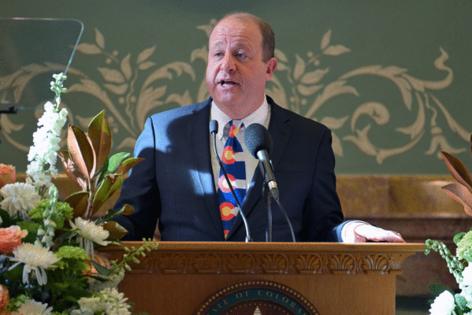Colo. Gov. Jared Polis joins other Democrats in opposing planned U.S. tariffs
Published in News & Features
With President Donald Trump threatening several U.S. trading partners with substantial tariffs the first of August, Gov. Jared Polis and other Democratic governors said Monday that they are taking steps to oppose policies they consider harmful to their states’ businesses.
Polis issued an executive order directing the Colorado Office of Economic Development and International Trade, or OEDIT, to form a task force to help state agencies to develop strategies to reduce the impacts of the Trump administration’s tariff policy and address the resulting uncertainty across the state’s economy.
Within 45 days of the order, the Governor’s Office of State Planning and Budgeting is expected to produce a report estimating the impact of tariffs in Colorado and, where possible, estimate the financial effects of the tariffs and potential future effects of current levies or those paused or delayed.
In 100 days, the leaders of the Colorado Department of Agriculture, OEDIT and the Department of Labor and Employment will submit plans to the governor’s office laying out how they will adapt state services and programs to meet the changing needs caused by U.S. tariff policy, according to the executive order.
Polis announced the executive order before meeting with small business owners in Boulder to discuss how tariffs and the on-again, off-again proposals to impose the taxes on various countries were affecting them. He said he heard “just devastating stories” from a high-tech health company, an apparel and outdoor clothing manufacturer and McGuckin Hardware, a third-generation business. The owners talked about staff reductions, having to raise prices and their fears of being able to keep the doors open.
“Just terrible stories across our economy, bad for consumers,” Polis said. “That’s one of the reasons we launched the executive order today, to help quantify that. It’s one thing to hear the stories, which are startling. But it’s another to back it up with real numbers, which we will be able to do through the executive order.”
The data will be shared with state agencies, Colorado’s congressional delegation and the Trump administration. “I don’t think any Colorado industry is untouched,” Polis said.
One of the points Polis said the governors want to make is that nearly all U.S. manufacturers use parts and supplies that come from other countries.
“If those are subject to tariffs coming in then a lot of that manufacturing will be offshored and moved overseas to avoid those tariffs,” Polis said. “It’s really a dangerous road we’re going down. I hope that the president heeds the call and I hope the information we’re putting together is helpful in helping him change his mind.”
Other Democratic governors who announced responses to Trump’s planned tariffs include Illinois Gov. JB Pritzker; Arizona Gov. Katie Hobbs; New York Gov. Kathy Hochul; Oregon Gov. Tina Kotek, and Washington Gov. Bob Ferguson. Pritzker, Hochul and Kotek all directed reviews of how tariffs are affecting the economy in their states.
Ferguson is leading a coalition of 24 public and private partners in filing a friend-of-the-court brief supporting a multistate lawsuit to block the Trump administration’s tariffs.
Trump campaigned on hiking tariffs as ways to reduce trade deficits with other countries and to boost U.S. revenue. He unveiled sweeping tariffs on April 2, which he dubbed “Liberation Day.” He then paused implementation for 90 days and further pushed back the launch to Aug. 1.
Tariffs levied by the administration include ones on steel, aluminum and cars.
Polis and Hunter Nelson, director of the Colorado office of the Small Business Majority, a national organization, said the uncertainty of when and whether more tariffs will hit is unnerving for business owners.
“We definitely are hearing a lot of concerns. There’s a lot of uncertainty. People are wondering what is going to be the long-term impact on their business, how do they begin to prepare for this,” Nelson said. “It’s a lot for an entrepreneur that’s already juggling the responsibilities of their day-to-day business.”
Many small businesses are operating on the margins and will have to raise prices if taxes on imports are imposed, Nelson said, putting them at a competitive disadvantage with larger businesses.
Polis said in addition to private companies, the state will review the effects of higher tariffs on state agencies.
“We are not exempt from tariffs, so just as consumers and individuals are forced to pay tariffs, so is the state,” Polis said.
That could lead to additional cutbacks because the state, already experiencing budget problems, would be forced to spend more “on everyday items just as you and I might around our kitchen table,” Polis added.
_____
©2025 MediaNews Group, Inc. Visit at denverpost.com. Distributed by Tribune Content Agency, LLC.







Comments